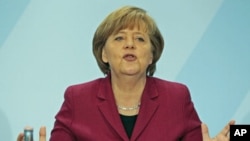German Chancellor Angela Merkel says her government's decision to shut down all its nuclear power plants within the next decade could serve as an example to other countries, but industry leaders are criticizing the decision.
Germany announced Monday that it would phase out all 17 of its nuclear power stations by 2022 and generate electricity from other sources. The decision was made in response to the public concern about the safety of atomic power following Japan's nuclear disaster this year.
Chancellor Merkel said Germany could serve as a global trailblazer for renewable energy. The implementation plan hammered out by the ruling coalition during a 12-hour meeting is expected to meet with fierce resistance from energy companies, as well as from some members of her own party.
Businesses and utility companies warn of increased costs of energy, especially in the regions that depend on nuclear power plants for electricity supplies.
There is also a concern that relying on renewable power sources, such as sun and wind and fossil fuels, could lead to power shortages.
Monday's decision reverses Germany's 2010 plan to extend the operation of the nuclear power facilities by another decade.
The government plan calls for closing most facilities by 2021. Only three of the 17 generating stations would be left in operation for an additional year, to ensure there is energy if shortages develop.
Germany's public has largely welcomed the decision. Environmentalists, including the Green Party, wanted the nuclear power industry shut down sooner, but pro-business groups say possible power shortages and increased energy costs could cripple German industry.
Some information for this report was provided by AFP and Bloomberg.




